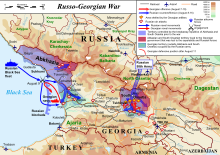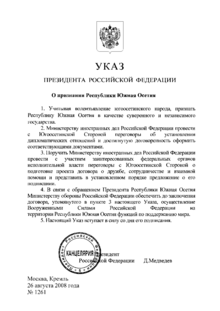User:Nanobear~enwiki/WarMedvedev
2008 South Ossetia war
[edit]

The long-lingering conflict between Georgia and the separatist of regions South Ossetia and Abkhazia, which were supported by Russia, escalated during the summer of 2008. In the night of 7-8 August, Georgia launched a surprise attack, codenamed "Operation Clear Field", against South Ossetia with 10,000–11,000 soldiers and 75 tanks. Several Russian peacekeepers were killed in the attack, and many South Ossetians had Russian citizenship.[1][2]
At the time of the attack, Medvedev was on vacation and Prime Minister Putin was attending the opening ceremony of the 2008 Beijing Olympics.[3] At about 1:00 a.m on 8 August, Medvedev held a telephone conversation with Defence Minister Anatoliy Serdyukov. It is likely that during this conversation, Medvedev authorised the use of force against Georgia.[4] The next day, Medvedev released a statement, in which he said:
Last night, Georgian troops committed what amounts to an act of aggression against Russian peacekeepers and the civilian population in South Ossetia ... In accordance with the Constitution and the federal laws, as President of the Russian Federation it is my duty to protect the lives and dignity of Russian citizens wherever they may be. It is these circumstances that dictate the steps we will take now. We will not allow the deaths of our fellow citizens to go unpunished. The perpetrators will receive the punishment they deserve.
— Dmitry Medvedev on 8 August 2008[5]
In the early hours of 8 August, Russian military forces launched a counter-offensive against Georgian troops. After five days of heavy fighting, all Georgian forces were routed from South Ossetia and Abkhazia. On 12 August, Medvedev announced an end to the Rusian military operation, entitled "Operation to force Georgia into peace". Later on the same day, a peace deal brokered by EU President Nicolas Sarkozy was signed between the warring parties. On 26 August, after being unanimously passed by the State Duma, Medvedev signed a decree recognising South Ossetia and Abkhazia as independent states. In total, 48 Russian soldiers, including 10 peacekeepers, were killed in the conflict, while the casualties for Georgia totaled 170 soldiers and 14 policemen.[6]
The Russian popular opinion of the military intervention was broadly positive, not just among the supporters of the government, but across the political spectrum.[7] Medvedev's popularity ratings soared by around 10 percentage points to over 70%,[8] due to what seen as his effective handling of the war.[9] Although Putin also had a visible role during the conflict, hurrying, for example, home from the Beijing Olympics to meet refugees arriving from the conflict zone, it was Medvedev who made the key decisions, authorising the use of force and leading the peace negotiations.[10] Western media coverage of the war was, however, very critical of Russia. Especially the American media was quick to take the side of Georgia. For example, early reporting by the New York Times credited Georgian claims, which later turned out unreliable, that Russia started the war. Later, an international fact-finding mission later confirmed that it was Georgia who started war, although according to it Russia responded with "disproportionate" measures.[7]
References
[edit]- ^ "EU report, volume II" (PDF). Independent International Fact-Finding Mission on the Conflict in Georgia. 30 September 2009. Retrieved 30 September 2009.
- ^ Nicoll, Alexander (September 2008). "Russia's rapid reaction". International Institute for Strategic Studies. Retrieved 9 December 2009.
{{cite web}}: Unknown parameter|coauthors=ignored (|author=suggested) (help) - ^ China still on-side with Russia Asia Times, 6 September 2008
- ^ Lavrov, Anton (2010). Ruslan Pukhov (ed.). The Tanks of August. Centre for Analysis of Strategies and Technologies. p. 49. ISBN 9785990232013.
- ^ Statement on the Situation in South Ossetia Website of the President of Russia, 8 August 2008.
- ^ Treisman, p.153
- ^ a b Treisman, p.154
- ^ Treisman, p.259
- ^ Sakwa 2011, p.343
- ^ Developments in Russian Politics 7. p. 242. ISBN 9780230224490.
